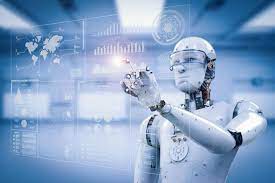
The Future Unleashed: Exploring the Potential of Artificial Intelligence (AI)
Artificial intelligence (AI) is a rapidly growing field of technology that has the potential to revolutionise the way we live. It is an umbrella term for a range of technologies, including machine learning, deep learning and natural language processing. AI has applications in almost every industry, from healthcare and finance to manufacturing and transportation.
At its core, AI is all about making machines smarter. It involves creating computer systems that can think and learn like humans, allowing them to take on tasks that would otherwise be too complex or time-consuming for humans to do. AI systems can analyse vast amounts of data quickly and accurately, identify patterns in data and make decisions based on those patterns. This makes them incredibly powerful tools for businesses looking to gain insights from their data or automate complex processes.
AI also has significant implications for the future of work. Many jobs are already being automated with AI-powered robots or algorithms, leading to fears that human workers will be replaced by machines. However, this doesn’t have to be a bad thing; AI can also create new opportunities for people by freeing them up from mundane tasks so they can focus on more creative endeavours.
The potential of AI is immense, but it comes with its own set of ethical considerations. As AI systems become more advanced, there are concerns about how they will be used responsibly and ethically. For example, there are worries about the potential for bias in AI-powered decision making or how it may be used for surveillance purposes. It’s essential that we develop safeguards to ensure these technologies are used responsibly and ethically as they become increasingly prevalent in our lives.
Overall, artificial intelligence is an incredibly exciting field with immense potential for transforming our lives in both positive and negative ways. As we continue to develop these technologies it’s essential that we think carefully about how they should be used responsibly and ethically so that we can ensure their benefits outweigh any risks associated with them.
9 Common Questions about Artificial Intelligence (AI) Answered
- What are the 3 types of AI?
- Should I write AI or artificial intelligence?
- Is IT correct to say an AI?
- Is AI the same as artificial intelligence?
- What are the 4 types of AI?
- Why is AI called artificial intelligence?
- Is artificial intelligence one word or two?
- What exactly AI means?
- Is it AI or artificial intelligence for short?
What are the 3 types of AI?
Narrow Artificial Intelligence (ANI)
Artificial General Intelligence (AGI)
3. Super Artificial Intelligence (SAI)
Should I write AI or artificial intelligence?
When writing, you can use either “AI” or “artificial intelligence” depending on the context and your personal preference. Both terms are widely understood and accepted. “AI” is commonly used as an abbreviation, especially in technical or informal contexts, while “artificial intelligence” is often used in more formal or explanatory settings. It’s important to be consistent throughout your writing, so choose the term that aligns with the tone and style of your piece and stick with it.
Is IT correct to say an AI?
Yes, it is correct to say “an AI.” The use of “an” before a noun depends on the sound that follows it. In this case, “AI” starts with a vowel sound (pronounced as “ay”), so we use the indefinite article “an” instead of “a.”
Is AI the same as artificial intelligence?
Yes, AI stands for Artificial Intelligence and is commonly used as an abbreviation for the term.
What are the 4 types of AI?
Reactive Machines
Limited Memory
Theory of Mind
4. Self-Awareness
Why is AI called artificial intelligence?
AI is called artificial intelligence because it is a form of intelligence that is created by humans and not naturally occurring. AI systems are designed to simulate human cognitive processes, such as problem solving and decision making, in order to perform tasks that typically require human intelligence.
Is artificial intelligence one word or two?
“Artificial intelligence” is typically written as two words. However, it is worth noting that in some contexts or stylized writing, it may be abbreviated as “AI” and treated as a single word.
What exactly AI means?
AI stands for Artificial Intelligence, which refers to a branch of computer science that focuses on creating intelligent machines that can think and act like humans. AI systems are able to learn from their environment, identify patterns, and make decisions based on their observations. AI technology is used in a variety of applications such as robotics, autonomous vehicles, facial recognition software, natural language processing (NLP), and more.
Is it AI or artificial intelligence for short?
AI is commonly used as an abbreviation for artificial intelligence. Both terms are widely accepted and used interchangeably to refer to the field of study and development of intelligent machines and systems.
